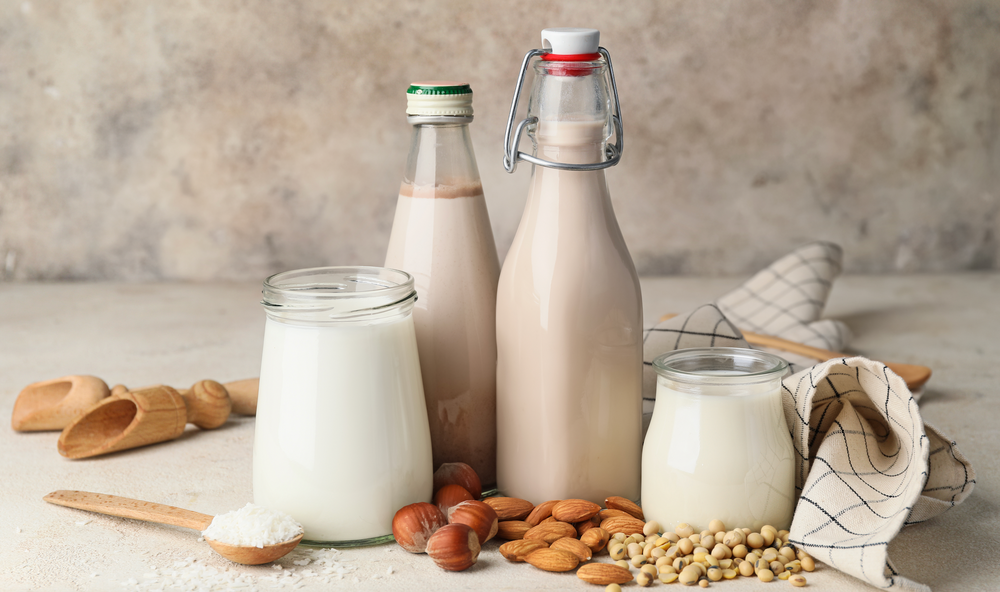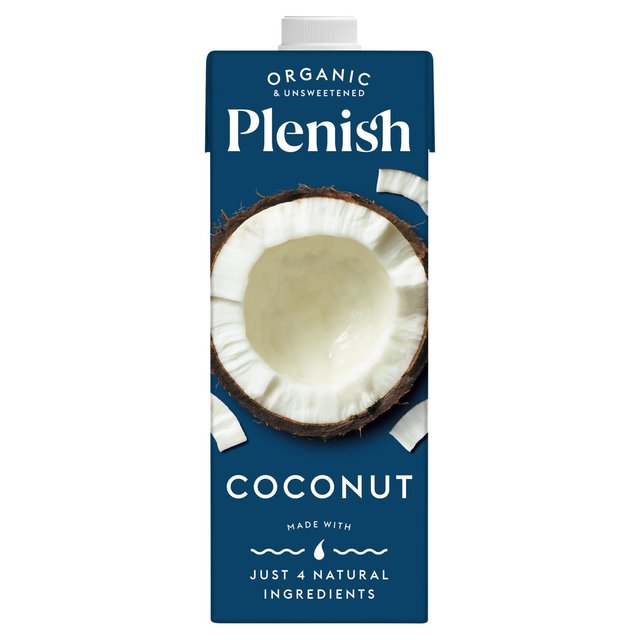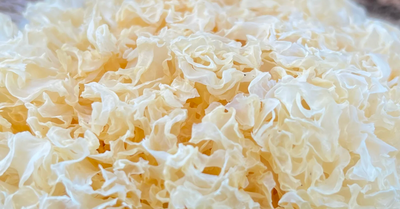
Guide To The Best Plant-Based Milks

Guide To The Best Plant-Based Milks
Guide To The Best Plant-Based Milks
Plant-based milks are increasingly popular whether you are vegan, lactose intolerant, trying to do your bit for the environment or simply not a fan of cow's milk. Walking down the long-life milk aisle we can choose anything from nut milks, to seed milks, to grain milks. We have a plethora of options but what are the best ones when it comes to nutrition, flavour and environmental impact? Let's have a look.
What do I need to consider when choosing a plant-based milk?
Is organic worth the extra cost?
Organic milks are better for the environment as they are free from pesticides, herbicides and promote better farming practices. On the other hand, organic milks are not fortified which is an important addition for those that remain totally dairy-free. Dairy-free milks are usually fortified with the vitamins and minerals that would typically be found in dairy products (vitamins D, B12, riboflavin and folic acid) and may need to be supplemented or consumed through other fortified products.
Environmental impact
A big reason many of us have shifted over to non-dairy products is related to the cost to our planet for producing cow’s milk. Any of these plant-based milks, whether they are made from nuts or grains, will have a smaller impact than cow’s milk, particularly when it comes to carbon emissions, water use and land use. Not only do these crops produce less emissions but they can also absorb carbon dioxide from the air. However some have a greener impact than others, and the four most popular milks have been compared below against 200mL of dairy cow’s milk.
Oat milk: 29% emissions, 8% land use, 8% water
Soy milk: 32% emissions, 7% land use, 4% water
Almond milk: 22% emissions, 6% land use, 59% water
Rice milk: 38% emissions, 4% land use, 43% water
In addition to the impact of the main nut or grain used, many of these milks have added ingredients like vitamins, thickening agents and sweeteners which will have an additional environmental cost.
Nutrition status:
Full-fat cow’s milk provides us with a lot of nutrition, it’s a source of protein, fat and nutrients including vitamin A, B12, selenium and, of course, calcium. So when we look for an alternative milk for cereal, tea and porridge we need to ensure it is providing us with adequate nutrition.
In terms of protein, only soy milk is able to match full-fat dairy milk, both contain around 3g of protein per 100mL, an important factor if you are struggling to meet your protein needs. Moving on to carbohydrates, carbohydrates are not unequivocally bad for us but they do spike our blood sugar levels if we are consuming them with low fat and low protein. Oat milk is the main culprit for this as it contains 8g carbohydrates per 100mL vs the 4g in whole milk and very little fat and protein.
Popular dairy-free milks and their uses
Nuts milks (Note: the nutritional figures listed below are averages and are not necessarily correct to the items tagged as examples)
Almond milk - 0.4g carbs, 3.1g fat, 1.3g protein
With a light texture, and a subtly sweet, nutty flavour this perfect for smoothies, baked goods and porridges. However it is a thinner consistency and may split in hot drinks of savoury creamy dish. The added nutrition comes from vitamin E, a powerful antioxidant that helps the body fight against oxidative stress from pollution.
Cashew milk - 1.5g carbs, 2.5g fat, 0.9g protein
This is rich and creamy with a subtle nutty flavour making it perfect for creamy soups and savoury sauces. Cashews are a good source of magnesium, which is a vital nutrient for muscle function and relaxation.
Coconut milk - 5.3g carbs, 1.1g fat, 0.5g protein
As opposed to the tinned version, cartons of coconut milk contain a thinner consistency more akin to cow’s milk. Creamy and subtly sweet flavour, this works well in coffee, smoothies, baked goods and porridge. Coconut milk contains medium-chain saturated fatty acids which have benefits on heart health and cholesterol.
Macadamia milk - 0.4g carbs, 2.4g fat, 0.4g protein
Rich, smooth and creamy flavour, great in coffee and smoothies. Macadamia nuts are a source of healthy mono-unsaturated fats.
Blended nuts milks are a great option, with a broader spectrum of nutrients being packed in and enhanced flavours, this works really well for almond milk as adding oat or coconut milk thickens up what can otherwise be a little too watery.
Legume milks
Hemp milk - 0.9g carbs, 2.7g fat, 0.1g protein
This milk provides a slightly sweet, nutty taste and a thin consistency akin to skimmed milk, making it perfect for hot drinks, baked goods and smoothies. A health kick from hemp milk straight to your brain as this is a source of omega-3 fatty acids, an anti-inflammatory that supports healthy brain function.
Soy milk - 4g carbs, 1.4g fat, 3g protein
A very versatile milk, this creamy consistency works well in savoury dishes, such as curry, hot drinks and on it’s own. Soy milk really stands out as the plant-based milk with the best protein content, it is also a complete protein meaning it contains all of the essential amino acids.
Grain milks
Oat milk - 7.8g carbs, 0.6g fat, 0.9g protein
A sweet and milk flavour, is quite a versatile milk used in cooking, baking and creates the creamiest hot drinks. While it has a high carbohydrate content that may be less beneficial in large quantities, oat milk does benefit from being high in beta-glucan, a soluble fibre that supports the gut, immune health and cholesterol levels.
Rice milk - 11g carbs, 1.3g fat, 0.1g protein
This is the least allergenic of the bunch, free from gluten, nuts and soy. It is naturally sweet, yet mild in flavour with a thinner consistency than milk. This is the highest carbohydrate-containing of the dairy-free milks, it’s a high glycemic index drink meaning it’s absorbed quickly in the gut and spikes blood sugar. So for this reason it might not be the best day-to-day milk to use, but blends well with less carbohydrate-rich milks.
Other milks
Potato milk - 1.3g carbs, 3g fat, 1.3g protein
Potato milk is the new kid on the block and while it may sound odd, this milk actually has a mild creamy flavour similar to soy. This works well in smoothies and steams nicely for a nice latte at home. It is one of the lowest environmental impact dairy-free milks, and the moderate protein and fibre content mean it’s likely to sustain you for longer than a nut alternative.
Final verdict
Dairy-free milks will always be better for the environment than their animal counterparts, however some are still better than others. If we were all to consume the same dairy free products the market can become overexploited and negatively impact the producers and the land used for these crops. The best option is to have a range of dairy-free milks that you like and are well-produced and alternate between these.










